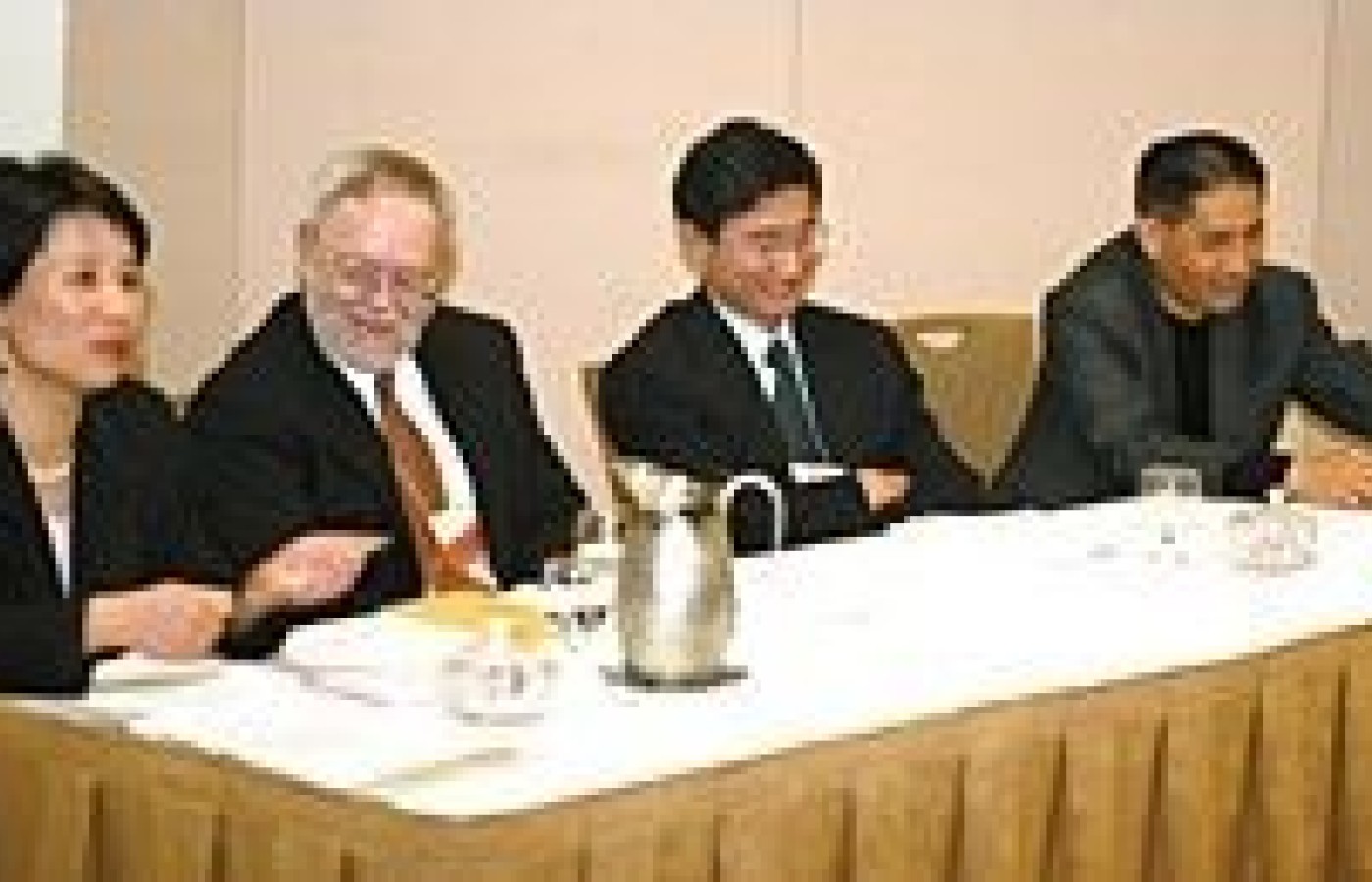The most important relationship I seek to nurture in the treatment room is the one a patient has with their own body. We live in a culture that teaches us to override pain, defer to outside authority, and push through discomfort. Patients often arrive hoping I can “fix” them, but the truth is, we can’t do the work for them. We can offer guidance, insight and support, but healing requires their full participation.
Landmark Conference Builds Bridges Between TCM and Western Medicine
EAST RUTHERFORD, N.J. - "Our goal is to reach the public with the message of traditional Chinese medicine. It is the public who will move TCM into greater use and acceptance." With those words Dr. Ka-Kit Hui, director of the Center for East-West Medicine at UCLA, began the Traditional Chinese Medicine World Foundation's second annual conference, Building Bridges of Integration for Traditional Chinese Medicine. The 2003 event hosted a multidisciplinary audience of an estimated 285 Eastern and Western health care professionals. Held in mid-October in New Jersey's Meadowlands, the forum focused on cancer, pain, immune system disorders and women's health. Participants engaged in far-ranging - and frequently passionate - dialogues on the challenges, opportunities and possibilities of an emergent medicine that blends traditional Chinese medicine and Western medicine. They also explored how the full system of traditional Chinese medicine could be integrated to address the nation's current health care needs to expand health options and improve medical outcomes for all Americans.
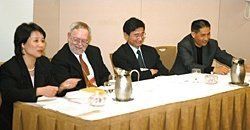
"For traditional Chinese medicine to become part of mainstream medicine, it's essential that we do more than talk to ourselves," commented Nan Lu, OMD, founding director of the TCM World Foundation. "Patients need traditional Chinese medicine; patients want traditional Chinese medicine. Western doctors with compassion and passion for their patients are frustrated because they don't have enough knowledge or information on this medical system and its better-known treatment, acupuncture.
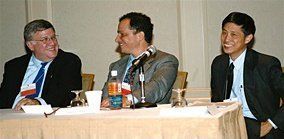
"This conference was established to help address this problem," Dr. Lu continued. "It allows acupuncturists to learn more about their profession and increase their skills. Here, they can also learn what Western health care practitioners are thinking and can explore ways to facilitate more dialogue among conventional doctors, patients and the acupuncture community."
Reflecting the multidisciplinary aspect of this event, co-sponsors included Mount Sinai School of Medicine (New York); the School of Social Welfare, State University of New York at Stony Brook; UCLA Center for East-West Medicine; the Susan Samueli Center for Complementary and Alternative Medicine at the University of California, Irvine; the Hackensack University Medical Center's Sanzari Center for Women's Health Resources and Center for Health and Healing (New Jersey); the Council of Colleges of Acupuncture and Oriental Medicine (Maryland), and InnoVision Communications, LLC (California), publishers of Alternative Therapies in Health and Medicine.
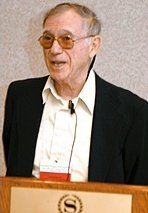
The event featured 37 presenters; seven panel sessions; 13 workshops with traditional Chinese medicine and Western health care experts; luncheon dialogues; an awards dinner; tai ji and qigong events; and a sold-out exhibition hall. The National Certification Commission for Acupuncture and Oriental Medicine granted continuing education units for acupuncturists. The conference also provided added value for Western practitioners by offering physicians, doctors of osteopathy and nurses medical education credits (CMEs).
Dr. Hui opened the conference with a keynote address, "Full-System Traditional Chinese Medicine and its Role in Integrative Medicine," which included case studies on how his center has successfully and cost-effectively addressed integrative systems. Mitchell Gaynor, MD, shared his insights on the impact of nutrition (or lack of it) in cancer with "Real Change for the Real World - Nutrition and Cancer." Mehmet Oz, MD, director of the cardiovascular Institute at Columbia Presbyterian Medical Center and host of Discovery Channel's new television show, "Second Opinion," co-presented with Dr. Lu on "The Heart, the King of the Organs: An Eastern and Western Perspective" to a standing-room-only crowd.
Among other conference highlights:
- Leon Hammer, MD, conducted a workshop on pulse diagnosis.
- Lonny Jarrett, MS, MAc, explored the spiritual side of healing.
- Kathleen Hui, MD, an assistant neuroscientist at Massachusetts General Hospital, engaged participants with her work titled "The Effects of Acupuncture on Deqi on Human Brain by fMRI."
- Michael Smith, MD, director of the Lincoln Recovery Center, presented "Acupuncture: The Value of the Non-Verbal," and discussed his lifelong work with underserved populations.
- Also exploring the dynamics of an emergent medical model were Boston psychiatrist Michael Johnson, MD, with "Treating Depression with TCM," and Dr. Hong Jin, dean of faculty at Oregon College of Oriental Medicine, with "TCM for Endometriosis."
- A luncheon dialogue, "Can the East Measure the West?" featured Lixing Lao, MD, director of TCM research at the Center for Integrative Medicine at the University of Maryland School of Medicine, and Rosa Schnyer, LAc, of the Osher Institute at Harvard Medical School, and helped attendees learn where current research in acupuncture might lead.
"We believe the 21st century will see the rapid ascent of TCM practice because of its capacity to successfully diagnose and prevent a wide range of chronic medical conditions," said Dr. Lu. "The American health care system now costs $1 trillion a year and these costs impose a huge burden on our society, as does the number of unsolved chronic conditions. Depression alone affects almost 10 percent of the population and costs America billions. TCM has a long history of successfully treating a wide variety of health problems, especially chronic ones. We believe TCM can make enormous contributions to wellness in the West."
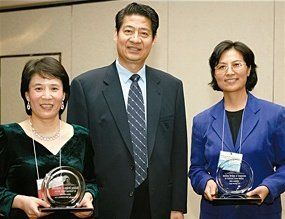
A research panel featured Dr. Richard Harris from the University of Michigan, who received an award for his work on "The Treatment of Fibromyalgia with Acupuncture." Fellow presenter Joyce Anastasi, PhD, RN, FAAN, LAc, director of AIDS research at the Columbia University School of Nursing, also received an award for her work on "Acupuncture for Chronic Nausea in HIV." Sunday brunch offered a lively World Café with participants exchanging views on core questions posed about emergent medicine.
At the awards dinner, Consul Jinsheng Dong, head of the science and technology division of the consulate general of the People's Republic of China in New York, spoke movingly of his amazement and happiness at seeing so many Western participants supporting traditional Chinese medicine, one of the jewels of Chinese culture. His remarks preceded the presentation of the second annual "Bridges of Integration" awards to recipients Lixin Huang, MS, president of the American College of Traditional Chinese Medicine, and Dr. Hong Jin, dean of faculty at the Oregon College of Oriental Medicine.
Attendees also had the opportunity to visit with 27 exhibitors, including more than half a dozen schools of Oriental Medicine and acupuncture; herbal manufacturers; healing technologies; insurance providers; and publishers.
The Foundation's next conference will be held Oct. 7-10, 2004 at the Sheraton Meadowlands Hotel and Conference Center in East Rutherford, NJ. For more information, visit www.tcmconference.org.
